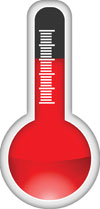

Capital expenditure projects expected to boost the South African temperature sensors market, says Frost & Sullivan.
Capital expenditure projects in the power generation and chemicals industries will sustain growth in the South African temperature sensors market in the short and medium terms. Factors such as improving process efficiency in South Africa’s process industries to reduce costs, produce superior-quality products and increase profitability, are expected to contribute towards higher revenue growth over the next five years.
New analysis from Frost & Sullivan (http://www.sensors.frost.com) finds that the South African temperature sensors market earned revenues of $11,9 million in 2008, and estimates this to reach $18,9 million in 2015. The technologies covered in this research are integrated circuit, infrared, thermocouples, thermistors, resistance temperature detectors and transmitters.
“A rise in the use of automation products within key end-user sectors has caused greater demand for temperature sensing products,” says Frost & Sullivan industrial automation analyst James Fungai Maposa. “This will aid the successful monitoring of process parameters, assist in the decision-making process, and help in effectively utilising and managing plant assets.”
Enhancing process efficiency has caused a rise in the purchase of sensor products to monitor critical processes and provide rapid feedback to help in the decision-making process for a particular plant. Electronic and digital temperature sensors have assisted end-user companies in maintaining quality control records and contributing to superior process and plant efficiency.
However, the global financial crisis has resulted in the reduction of resources available for capital investment in the key end-user sectors of temperature sensing devices, such as the metals and mining industry.
“The global economic slowdown has adversely affected the South African process industries, consequently tightening capital expenditure,” explains Maposa. “Companies within key end-user sectors such as the metals, minerals and mining, and chemicals and petrochemicals industries have announced an undercutting of previous capital expenditure budgets.”
Despite the prevailing economic uncertainty, investments within end-user industries such as power generation, chemicals and petrochemicals and water and wastewater will continue due to South Africa’s higher demand for energy and access to clean water. Frost & Sullivan believes that this trend will contribute to strong growth of the market in the long term.
“Key projects within the power sector such as selected station revamps and the construction of the Medupi and Kusile power stations are expected to significantly increase the demand for temperature sensing devices in the long-term. To fully leverage emerging opportunities, market participants should analyse the end-user market for a better understanding of the industry to which they want to supply their products,” concludes Maposa.
For more information contact Patrick Cairns, Frost & Sullivan, +27 (0)18 464 2402, [email protected], www.frost.com
© Technews Publishing (Pty) Ltd | All Rights Reserved